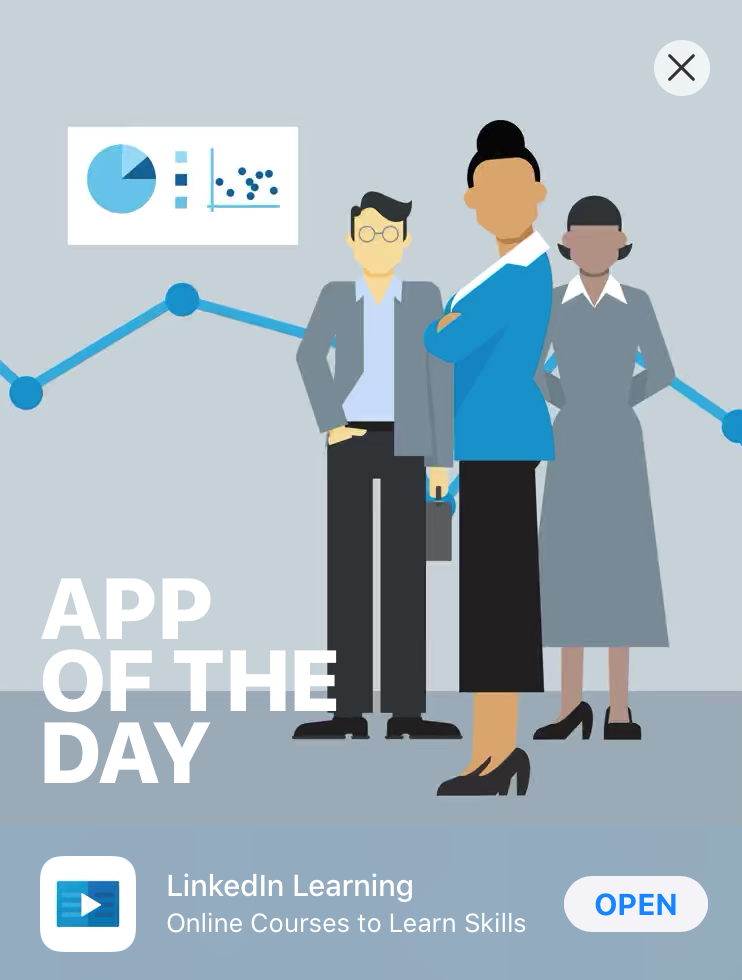For my Assignment #1 I focused on Linkedin Learning, a learning and development mobile app that allows the user to work through training modules on demand. It is an example of the evolution of the MOOC model toward freemium micro-learning platforms.
Linkedin has secured a solid foothold in the on-demand learning industry by catering to the inspiring professions that frequent their career search website. Linkedin has achieved this by marketing to employees but selling to employers. In fact, all active UBC students, faculty and staff have free, unlimited access to LinkedIn Learning’s video tutorials. More and more workers are taking control of their own learning, challenging traditional PD structures that take too long to coordinate
I chose a Vlog format to present my assignment as product reviews targeting mobile users are, arguably, best delivered in video format. I have also applied what I have learned in Linkedin Learning’s course, “Creating and Deploying Microlearning.” I would appreciate your thoughts and feedback.

Content is king. Indeed. I totally agree with your critique. It’s kind of nuts to charge $35 a month when the user isn’t going to get anything for that. Certainly they’ll learn, and that’s wonderful, but if you’re spending a few hundred dollars a year, I imagine you’d want something a little more tangible.
Thanks Tyler. There is an argument to be made about questioning the value and standards of existing credentialing bodies (like universities and trade schools) but the current reality is that these institutions still control the market they are still the gold standard providers of parchment. Hopefully disruptive contenders like Linkedin, Coursera and Utimy will rock the ivory tower some and continue to push for market based standards for quality. I was impressed with how Linkedin Learning is targeting employees and students but asking employers and institutions to pay. Here is a link that provides all UBC staff, students and faculty free access. https://linkedinlearning.ubc.ca/news/
Totally agree about the ivory tower. I hate how obsessed our society is with letters and pieces of paper. I see all the time how grades are another form of currency and it’s ridiculous. A lot of my students, if they had to choose, I know would prefer an A to having learned something and no letter grade. It’s bananas!
Hi Jaime,
Thank you for this analysis. I have been successful with my own MOOC experience, and I am interested in exploring more topics. I found it challenging because it is easy to lose momentum with it. Are you considering continuing on with a paid subscription? Or was it a valuable experience for a month, and now it is time to move on? Does the $35/month provide incentive and the necessary motivation for you to continue your learning? I would be interested in trying this because I can see so many positives from your Vlog. I wonder if Linkedin should approach an external qualifying body to provide certified accreditation for its programs. This review has piqued my interest.
Hi Kristin,
I was really pleased to see that, as UBC students we can access all the Linkedin Learning material for free. It appears that LL is pushing the boundaries of “freemium” models and by-passing the causal user to position their product squarely in front of the professional development and organizational development markets. I think we are going to see more examples of sponsored access to resources such as LL, disguised as an employment or enrollment perk.
JT
Hi Jamie,
Thanks for sharing. I had not heard of Linkedin Learning before so this was a great review of the keys features and downfalls. I would be interested in checking it out, can you provide more information about how to access it for free as a UBC student?
Thank you Katlyn. Here is a link to the UBC page providing access. https://linkedinlearning.ubc.ca/ Students, staff and faculty can sign-in using their CWL.
Hi Jamie, thank you for an interesting analysis of LinkedIn Learning. I’ve seen links to the platform before but I’ve never really gone down the rabbit hole myself and evaluated their offering. I agree with your take that this seem like an evolution of the MOOC format and it certainly does seem as if it holds potential for Professional Development opportunities. A general criticism of MOOCs though is that they often struggle to effectively implement elements of social learning and I was wondering what the interaction was like among course participants on the LinkedIn Learning platform? Additionally, do you know whether there is any data on course completion rates on the platform vs traditional MOOCs?
Hi Carla,
Sorry for the delay getting back to you. I was also unclear how Linkedin Learning would provide a social learning dynamic to their courses and so I did a quick search and came up with this, https://business.linkedin.com/content/dam/me/learning/en-us/pdfs/linkedin-learning-qa-feature-overview-feb2019.pdf
They provide a Q&A feature for their courses but frankly I find it weak compared the interactivity I have experienced with other MOOCS like FutureLearning and Coursera. Even Lynda.com provided more interaction than I am currently seeing with LL – perhaps because the new model focuses more on microlearning chunks.
Thanks again for your question. Oh ya. I have not been able to find any completion rates for LL. Perhaps they will provide some data after their second year.